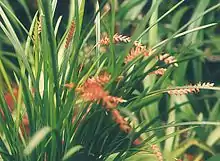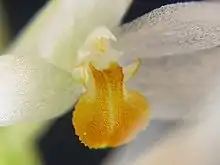Dendrochilum
Dendrochilum (commonly abbreviated Ddc. in horticulture[2]) is a genus of epiphytic, lithophytic and a few terrestrial flowering plants in the orchid family (Orchidaceae). The name of this genus is derived from Ancient Greek words dendron ("tree"), and either cheilos ("lip")[3] or chilos ("green food"), alluding to either the flowers' large lip or to their epiphytic growth. These orchids are popular among fans of non-traditional orchid curiosities.
| Dendrochilum | |
|---|---|
 | |
| Javier's dendrochilum (Dendrochilum javieriense) with numerous inflorescences | |
| Scientific classification | |
| Kingdom: | Plantae |
| Clade: | Tracheophytes |
| Clade: | Angiosperms |
| Clade: | Monocots |
| Order: | Asparagales |
| Family: | Orchidaceae |
| Subfamily: | Epidendroideae |
| Tribe: | Arethuseae |
| Subtribe: | Coelogyninae |
| Genus: | Dendrochilum Blume |
| Type species | |
| Dendrochilum aurantiacum Blume | |
| Species | |
|
100-300, see List of Dendrochilum species | |
| Synonyms[1] | |
Distribution and description

They are distributed at higher elevations in the humid rainforests throughout the Malesian region, with some in the surrounding lands; thus they occur from Southeast Asia to New Guinea. But most species are found on Borneo or the Philippines.[1]
This genus produces miniature, fragrant, star-shaped flowers that are generally produced in two rows on erect or arching pendant, many-flowered racemes. These inflorescences can grow to a length of 50 cm (20 in) (e.g. in the Hay-scented Orchid, D. glumaceum). The stems are ovoid to cylindrical, striped, sharply reduced pseudobulbs, about 4–10 cm (1.6–3.9 in) long, with green to brown bracts at their base. Each carries one or two tough, erect and lanceolate leaves, usually about 20 cm (7.9 in) long, with narrow petioles. The elliptical leaves of the Long-leaved Dendrochilum (D. longifolium) may grow to a length of 40 cm (16 in).
Taxonomy
The precise number of species is disputed; many websites accept as few as 100 or so, while others recognize far more. The World Checklist of Monocotyledons for example lists 390 records, including names that have become synonyms. Numerous new taxa have become known in recent decades;[4] in the Dendrochilum species list on Wikipedia, a more split-up approach is followed pending more up-to-date information. For it seems that the very low species numbers are certainly gross overlumping, and while the very high numbers sometimes presented are probably a result of oversplitting, they are likely to be closer to the truth.
Many of these orchids (67 species in the list used here) were named by Johannes Jacobus Smith, an eminent Dutch botanist. The genus' type species, described by Carl Ludwig Blume in 1825, is Dendrochilum aurantiacum of Java and Sumatra. Several species were formerly separated in Acoridium (established by Christian Gottfried Daniel Nees von Esenbeck and Franz Julius Ferdinand Meyen in 1843) or Platyclinis (established by George Bentham in 1881), but these two taxa are nowadays regarded as synonyms of Dendrochilum.
Selected species
Footnotes
- Kew World Checklist of Selected Plant Families
- http://www.rhs.org.uk/RHSWebsite/files/87/87be8b1e-908e-4e04-9ee6-30c438354458.pdf%5B%5D
- Schubert, R., & Wagner, G. (1988). Botanisches Wörterbuch (9th edition). Stuttgart: Gustav Fischer.
- e.g. Pedersen (1997), Wood (1997)
References
- Banks, David & Cootes, Jim (1995): The genus Dendrochilum. In: Orchids Australia.
- Barkman, T.J. & Wood, J.J. (2004): The genus Dendrochilum. In: Pridgeon, A.; Chase, M.; Cribb, P. & Rasmussen, F.N. (eds.): Genera Orchidacearum (Vol. 3). Oxford University Press, Oxford, UK.
- Cootes, J. (2002): Dendrochilum: elegance in miniature. Orchid Review 110(1246): 212-217.
- Pedersen, H.A. (1997): The genus Dendrochilum (Orchidaceae) in the Philippines – a taxonomic revision. Opera Botanica 131: 5-205.
- Wood, J.J. (1997): Orchids of Borneo (Vol.3: Dendrobium, Dendrochilum and others). Sabah Society, Kota Kinabalu and Royal Botanic Gardens, Kew.
External links
 Media related to Dendrochilum at Wikimedia Commons
Media related to Dendrochilum at Wikimedia Commons Data related to Dendrochilum at Wikispecies
Data related to Dendrochilum at Wikispecies